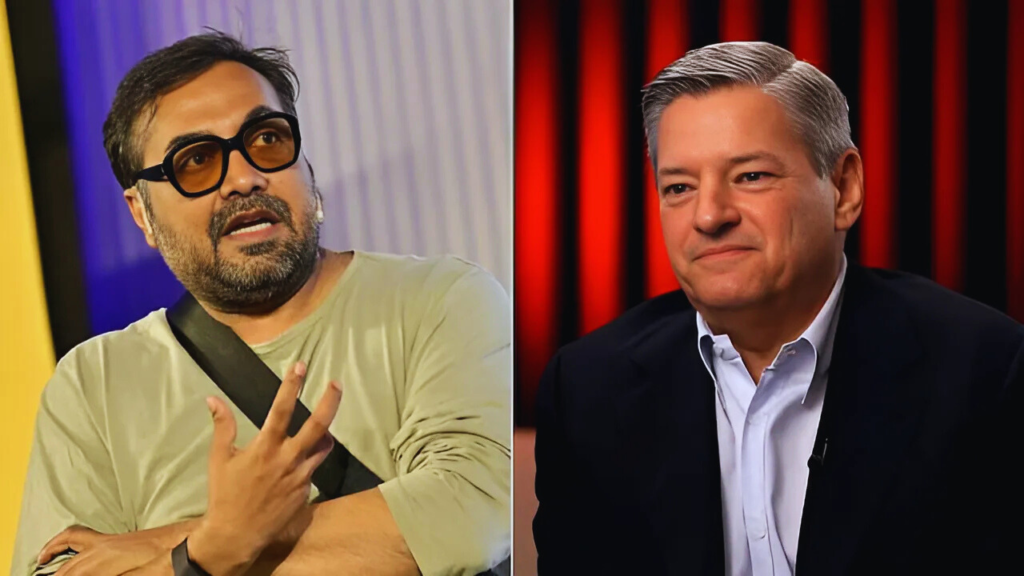Indian filmmaker Anurag Kashyap is known for his fearless voice and uncompromising stand when it comes to creative integrity. True to form, Kashyap recently made headlines by calling Netflix co-CEO Ted Sarandos “dumb”. After Sarandos suggested that Netflix’s Indian debut with Sacred Games might have been too risky. And that launching with a more traditional Indian drama like a “saas-bahu” serial might have been wiser. Kashyap didn’t take the comment lightly—and what followed was a sharp public rebuke that has reignited conversations. About creative risk-taking, cultural understanding, and the role of streaming platforms in shaping local storytelling.
The Controversial Comment by Ted Sarandos
During a public discussion on Netflix’s global expansion strategy. Ted Sarandos reflected on how the company had approached different international markets. While talking about India, he remarked that perhaps Netflix made a mistake by debuting with a bold and edgy show like Sacred Games. He added that in hindsight, something more aligned with traditional Indian television. Like the tried-and-tested saas-bahu (mother-in-law and daughter-in-law) family dramas—might have helped the company reach a wider audience faster.
Sarandos’ remarks were interpreted by many in the industry as a dig at Sacred Games. The very show that helped Netflix establish its presence in India in 2018. The show, co-directed by Anurag Kashyap and Vikramaditya Motwane, was widely celebrated for its gritty. Storytelling, cinematic execution, and bold themes—marking a turning point in the evolution of the Indian web series.
Anurag Kashyap Responds With Strong Words
Anurag Kashyap didn’t hold back. Taking to Instagram, he reacted strongly to Sarandos’ comments, calling him the “definition of dumb.” He further wrote, “Always knew tech guys are dumb when it comes to storytelling,” clearly pointing to a larger disconnect between corporate executives and the creative community. In Kashyap’s view, dismissing Sacred Games as a poor choice reflects a shallow understanding of what drives cultural relevance and creative impact in India.
Kashyap’s comment struck a chord with many in the film fraternity, who echoed the sentiment that Netflix’s Indian launch, while not instantly mass-appealing, pushed boundaries and set the tone for higher storytelling standards.
Sacred Games: Not Just a Series, But a Movement
Released in 2018, Sacred Games was Netflix India’s first original series and it created a massive cultural buzz. Featuring actors like Nawazuddin Siddiqui, Saif Ali Khan, Radhika Apte, and Pankaj Tripathi, the series combined noir crime fiction with political drama, religious themes, and dystopian storytelling—something previously unseen on Indian screens.
Critics praised it for its rawness, non-linear narrative, and the confidence to confront uncomfortable truths about Indian society. For urban viewers and global Indian audiences, it represented a breath of fresh air compared to mainstream Indian television content.
To suggest that such a project was a mistake, Kashyap and others argued, undermines the evolution of Indian storytelling and the audiences that embraced it.
Saas-Bahu vs. Sacred Games: The Bigger Picture
Sarandos’ suggestion about going with saas-bahu serials may have been a business-oriented observation, but it missed the emotional and cultural mark. Traditional soap operas are known for melodrama, repetitive plotlines, and simplistic conflicts—often criticized for their lack of nuance.
While they do attract mass audiences, especially among older generations and rural households, the growing appetite among younger Indian viewers has shifted toward bold, intelligent, and diverse content—something Sacred Games delivered.
By choosing to begin with a challenging project, Netflix may have alienated some traditional TV viewers, but it also earned credibility among filmmakers and progressive audiences. Kashyap’s anger seems rooted in the idea that risking creativity shouldn’t be viewed as a mistake just because it didn’t follow a mainstream formula.
A Pattern of Misunderstanding?
This isn’t the first time that streaming platforms have been accused of misunderstanding local content dynamics. Filmmakers in India have previously expressed frustration at how global platforms prioritize algorithms and data over storytelling nuance.
Kashyap has been vocal in the past about corporate interference and editorial censorship. His strong reaction to Sarandos’ remarks highlights the growing rift between creators and platform executives when it comes to deciding what kind of content “works” in a given market.
Support from the Creative Community
Several filmmakers, writers, and actors have quietly voiced support for Kashyap’s stand. While not all have made public statements, social media is abuzz with discussions on how platforms need to trust creators and understand that short-term viewership metrics should not be the sole standard of success.
The creative risk of Sacred Games paved the way for other daring shows like Delhi Crime, Leila, and Kohrra. These projects may not have attracted “mass” audiences immediately, but they have established India as a global player in high-quality web series storytelling.
The Road Ahead: A Need for Creative-Focused Strategies
This episode brings to light a broader debate about how streaming platforms navigate new markets. Should they adapt by mirroring local TV habits, or should they introduce fresh perspectives to uplift content standards? Kashyap’s argument is for the latter—that genuine storytelling will always find an audience if platforms dare to back it.
As India’s streaming landscape continues to evolve, this moment could serve as a turning point. It’s a reminder to platform executives that behind every piece of content are creators who invest emotionally and artistically. Reducing their work to “strategic missteps” without acknowledging their value can be both insulting and damaging.
Creativity Should Not Be a Compromise
Anurag Kashyap’s outburst was more than a personal attack—it was a call for respect, for stories that take risks, and for the people who make them. Whether or not one agrees with his words, the message is clear: bold storytelling deserves recognition, not second-guessing.
Netflix’s success in India owes much to Sacred Games—not just in numbers, but in how it opened the gates for a new kind of Indian narrative. In the end, creativity should be celebrated, not questioned, especially by those profiting from its power.



















